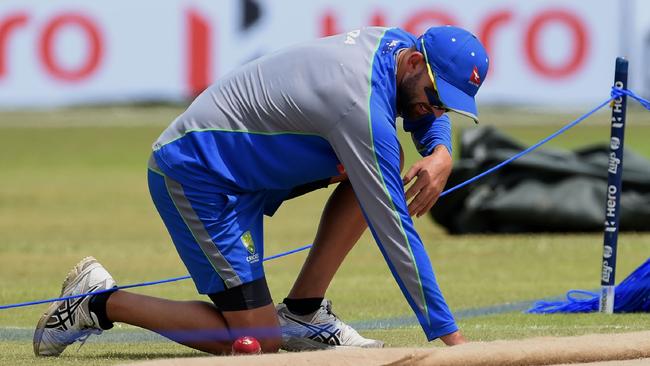Claims Sri Lanka’s 2016 Galle victory was fixed
Another cricket match-fixing scandal with allegations the 2016 Australia-Sri Lanka Test at Galle was corrupted by ground staff.

Cricket faces another match-fixing scandal after allegations the Australia-Sri Lanka Test at Galle in August 2016 was corrupted by criminals who paid off a key member of the ground staff.
The Weekend Australian published an exclusive story on the third day of the match claiming the wicket had been doctored. Those allegations have now been backed by the investigative unit of broadcaster Al Jazeera, which will air further claims in a documentary that goes to air tomorrow morning.
Batting second, Australia lost all 20 wickets in just 501 deliveries and lost the match by 229 runs. David Warner topscored in both innings with knocks of 42 and 41 as Sri Lanka’s spinners ran amok on a wicket that was allegedly doctored to ensure there would be a result.
The criminals boasted they had bet large amounts on the match not ending in a draw. The Test was over in 2½ days and the Australian batsmen were widely condemned for their performance. There is no suggestion the Australian players were aware of the plans.
Eight of the visitors posted single-digit scores as the side was bowled out for 106 in the first innings. Joe Burns and Usman Khawaja were dropped from the next match as a result of their failures in the Test.
The men also claimed they fixed a match in July last year at Galle against India, ensuring the wicket was hard and true. The men said they laid money on a high first-innings score and were rewarded when India made 600.
SEE OUR STORY IN 2016: Galle pitch may have been doctored by curators
The Al Jazeera investigation uses secret cameras to record former first-class player Robin Morris, Dubai-based Indian businessman Gaurav Rajkumar and the Galle stadium assistant manager, Tharanga Indika, discussing how the fix was arranged and offering to repeat it.
Another alleged accomplice, Sri Lankan first-class player Tharindu Mendis, is also filmed in one of the meetings.
The Australian side was concerned in 2016 about the difficulties of batting on an extraordinarily dry wicket, with Warner speaking later about what they faced.
“You’re sitting ducks when you’re facing six balls in a row — one of them is going to have your name on it,” the opener explained. “People don’t realise that you’re going out here — day one and day two and it’s turning square.”
The Weekend Australian was alerted on the morning of the third day to further attempts by the ground staff to aid spinners and end the match early.
Photographs obtained at the time revealed a deep scouring that had appeared overnight in the area where the spinners would land the ball. Match referee Chris Broad was seen arguing with the curator at the time, but gave the wicket a pass mark.
Al Jazeera’s crew filmed the curator and those who claimed they arranged the sting explaining that wire brushes used to sweep the pitch were used more firmly to gain the effect.
“One thing he can do during the match is the brush thing,” Mendis explained.
“You just do it slowly. What they do then is press it inward,” Morris added.
In the program, the groundsman and assistant manager at the stadium, Indika, describes how he made a pitch to favour bowlers and make it difficult for batsmen.
“In that five-day match, we prepared the wicket poorly without using a roller. In that way we made a spinning wicket,” he said.
At a meeting in a hotel in Galle, Morris gestured towards the groundsman, Indika, and said: “What happens is he — we — can make a pitch to do whatever we want it to do.
“Because he’s the main curator. He is the assistant manager and curator of the Galle stadium.
“Yes, if you want a pitch for spin bowling or pace bowling or batting, it can be done,” Indika said.
Indika, 43, explained on footage captured by a hidden camera how he prepared the pitch for a game such as the one the Australians participated in.
“We leave the wicket uncovered for about two weeks. Don’t water it and this will cause damage to the wicket,” he says.
The match fixers claimed they did their preparation before the ICC arrived to inspect the pitch.
The Al Jazeera team posed as people keen to be part of match fixing, meeting with various parties in Mumbai and Galle. The groundsman abruptly left the meeting he attended in a Sri Lankan hotel, the masterminds explaining he was nervous about being caught as his predecessor in the job had been.
The fixers claimed they paid the groundsman $37,000 to doctor a Test match and explained to the undercover reporters that they did not want any money upfront but would take 30 per cent of winnings if they became involved.
The ICC confirmed this week it was investigating the complaints.
“We have already launched an investigation working with anti-corruption colleagues from member countries based on the limited information we have received,” the organisation said. “We have made repeated requests that all evidence and supporting materials relating to corruption in cricket is released immediately to enable us to undertake a full and comprehensive investigation.”
Cricket Australia contacted players during the week to alert them to the allegations. Rajkumar and Morris denied they were involved in match fixing, claiming they believed they were filming a movie. Indika said his conversations were to be hospitable.
Cricket’s match fixers will be shown on Al Jazeera English at 6am tomorrow (AEST) and at 10pm on Monday.




To join the conversation, please log in. Don't have an account? Register
Join the conversation, you are commenting as Logout